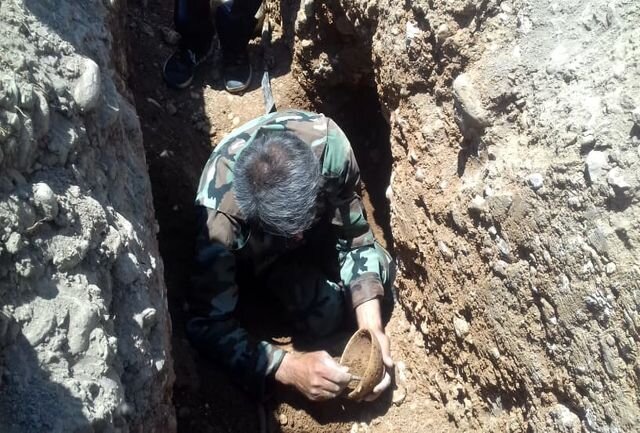Millennia-old tomb, relics unearthed in southwestern Iran

TEHRAN –An ancient tomb in Chitab, southwestern Kohgiluyeh, and Boyer-Ahmad province has been discovered accidentally by local farmers.
While working on their agricultural lands, the farmers stumbled upon an ancient tomb, which is estimated to date back to the first millennium BC, the deputy provincial tourism chief has said.
Also found in the tomb were three 3,000-year-old clay utensils, Rahim Dadinejad announced on Tuesday.
A team of archaeologists and cultural heritage experts is exploring the ancient tomb and to continue agricultural activities, a temporary water canal has been designed to reach agricultural farms, the official added.
Kohgiluyeh and Boyer-Ahmad province is known for its nomads and nomadic life. Sightseers may live with a nomadic or rural family for a while or enjoy an independent stay and assist them with day-to-day life. It also opens up an opportunity to feel rustic routines, their agriculture, traditions, arts, and culture.
Iran is home to one of the world’s oldest continuous major civilizations, embracing settlements dating back to 4000 BC. It also hosts some of the world’s oldest cultural monuments including bazaars, museums, mosques, bridges, bathhouses, madrasas, gardens, rich natural, rural landscapes as well as 24 UNESCO World Heritage sites.
The name of Iran, formerly known as Persia, mostly conjures up the first Persian Empire, ruled by the Achaemenids (ca. 550 – 330 BC) and sites such as Pasargadae and Persepolis. However, there are tens of prehistorical sites as the Burnt City in Sistan-Baluchestan, Tepe Sialk in Kashan, Susa, and Chogha Zanbil in the Khuzestan province, and Ecbatana in Hamedan which predate the Achaemenid period.
From a wider point of view, Iranian history can be divided into Pre-Islamic and Islamic eras. The Medes unified Iran as a nation and empire in 625 BC. The Islamic conquest of Persia (633–656) that put an end to the mighty Sassanid Empire (224–651) was a turning point in the history of the nation.
ABU/AFM
Leave a Comment